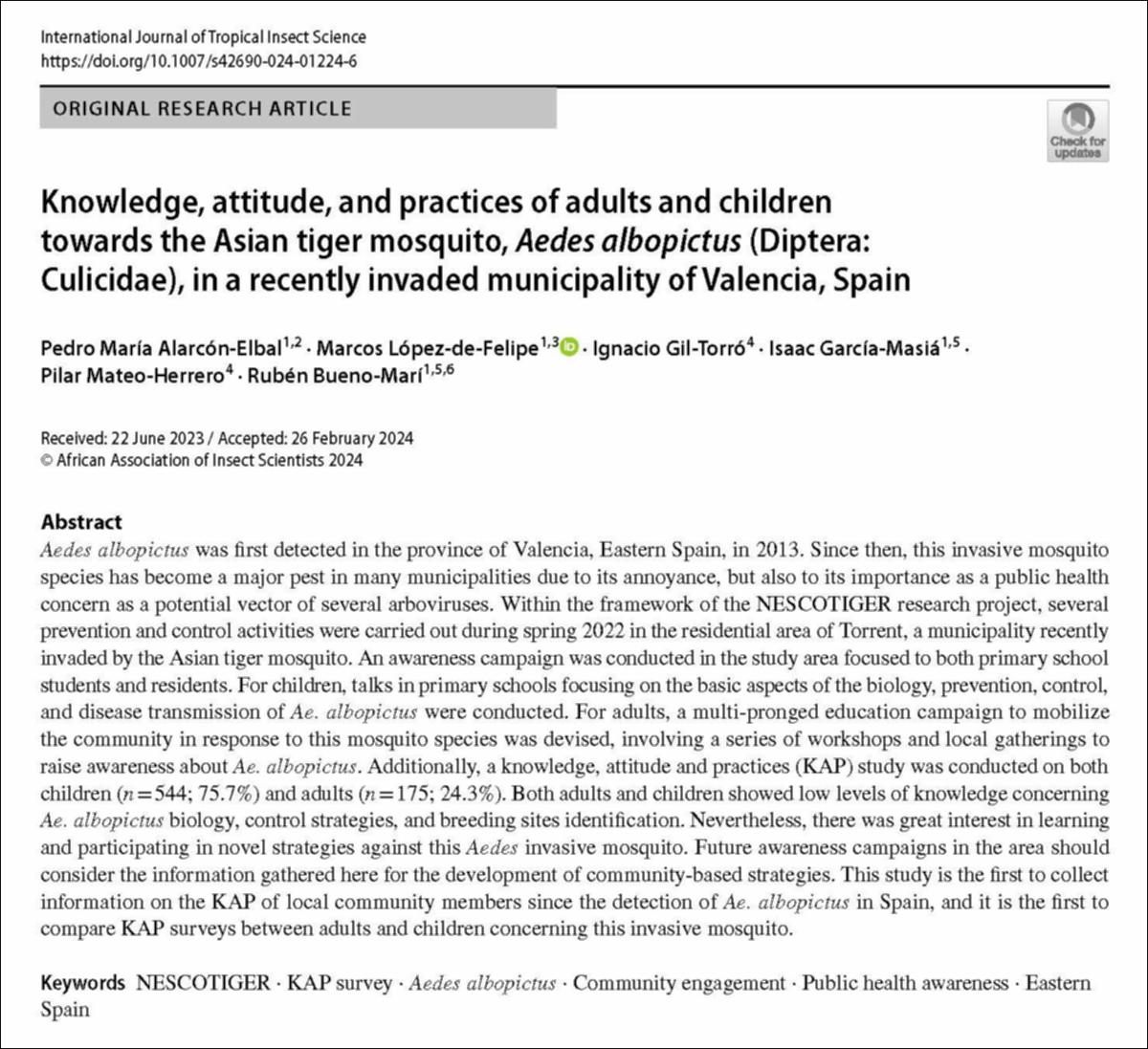Por favor, use este identificador para citar o enlazar este ítem:
http://hdl.handle.net/10637/16394Knowledge, attitude, and practices of adults and children towards the Asian tiger mosquito, "Aedes albopictus" (Diptera: Culicidae), in a recently invaded municipality of Valencia, Spain

Ver/Abrir:
Knowledge_Alarcon_IJTIS_2024.jpg
511,25 kB
JPEG
Ver/Abrir:
Knowledge_Alarcon_IJTIS_2024.pdf
Acceso restringido
1,24 MB
Adobe PDF
Request a copy
| Título : | Knowledge, attitude, and practices of adults and children towards the Asian tiger mosquito, "Aedes albopictus" (Diptera: Culicidae), in a recently invaded municipality of Valencia, Spain |
| Autor : | Alarcón Elbal, Pedro María López de Felipe, Marcos Gil Torró, Ignacio García Masiá, Isaac Mateo Herrero, Pilar Bueno Marí, Rubén |
| Materias: | Insecto; Insects; España; Spain; Comunidad Valenciana; Community of Valencia; Transmisor de enfermedad; Disease vector |
| Editorial : | Springer Nature |
| Citación : | Alarcón Elbal, P.M., López de Felipe, M., Gil Torró, I., García Masiá, I., Mateo Herrero, P., & Bueno Marín, R. (2024). Knowledge, attitude, and practices of adults and children towards the Asian tiger mosquito, "Aedes albopictus" (Diptera: Culicidae), in a recently invaded municipality of Valencia, Spain. International Journal of Tropical Insect Science, 44, 1633–1648. https://doi.org/10.1007/s42690-024-01224-6 |
| Resumen : | Aedes albopictus was first detected in the province of Valencia, Eastern Spain, in 2013. Since then, this invasive mosquito species has become a major pest in many municipalities due to its annoyance, but also to its importance as a public health concern as a potential vector of several arboviruses. Within the framework of the NESCOTIGER research project, several prevention and control activities were carried out during spring 2022 in the residential area of Torrent, a municipality recently invaded by the Asian tiger mosquito. An awareness campaign was conducted in the study area focused to both primary school students and residents. For children, talks in primary schools focusing on the basic aspects of the biology, prevention, control, and disease transmission of Ae. albopictus were conducted. For adults, a multi-pronged education campaign to mobilize the community in response to this mosquito species was devised, involving a series of workshops and local gatherings to raise awareness about Ae. albopictus. Additionally, a knowledge, attitude and practices (KAP) study was conducted on both children (n = 544; 75.7%) and adults (n = 175; 24.3%). Both adults and children showed low levels of knowledge concerning Ae. albopictus biology, control strategies, and breeding sites identification. Nevertheless, there was great interest in learning and participating in novel strategies against this Aedes invasive mosquito. Future awareness campaigns in the area should consider the information gathered here for the development of community-based strategies. This study is the first to collect information on the KAP of local community members since the detection of Ae. albopictus in Spain, and it is the first to compare KAP surveys between adults and children concerning this invasive mosquito. |
| Descripción : | Este recurso no está disponible en acceso abierto por política de la editorial. Esta investigación pertenece a una serie de estudios realizados para el proyecto NESCOTIGER: "New strategies for the control of the tiger mosquito in residential areas”. |
| URI : | http://hdl.handle.net/10637/16394 |
| ISSN : | 1742-7592 (Electrónico) |
| Fecha de publicación : | 23-may-2024 |
| Centro : | Universidad Cardenal Herrera-CEU |
| Aparece en las colecciones: | Dpto. Producción y Sanidad Animal, Salud Pública Veterinaria y Ciencia y Tecnología de los Alimentos |
Los ítems de DSpace están protegidos por copyright, con todos los derechos reservados, a menos que se indique lo contrario.

